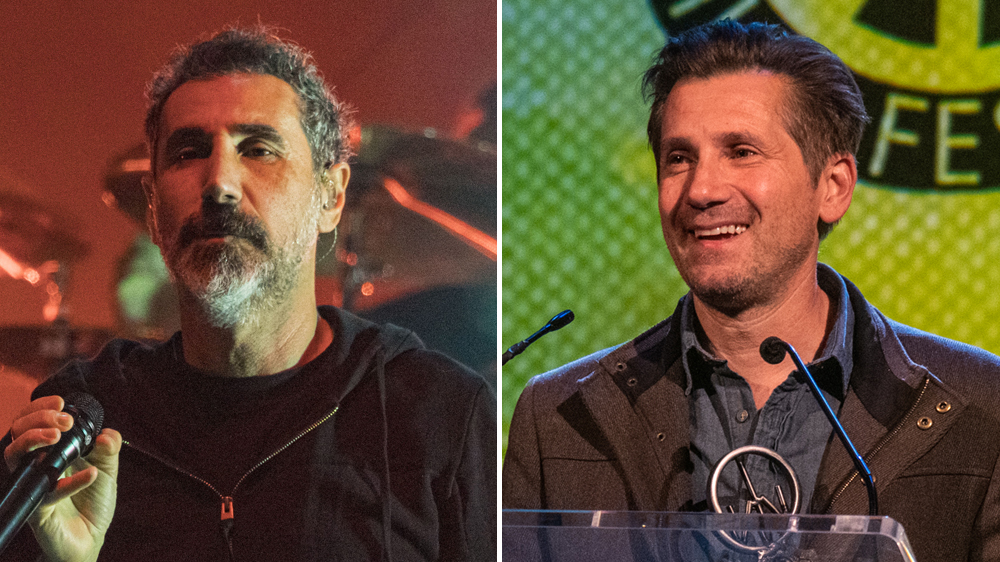Shortly after actor-director Michael Goorjian wrote the script for “Amerikatsi,” which is Armenia’s candidate for the international Oscar, he turned to System of a Down frontman Serj Tankian – who is also of Armenian descent – for feedback on the tale of an Armenian-American who repatriates in 1948 to what has become Soviet Armenia.
The Grammy-winning musician and political activist then became an executive producer on the film, which uses an ironic Chaplin-esque tone to depict the dream of the Armenian diaspora to reconnect with their roots.
Goorjian, who wrote and directed the movie, also stars as Charlie, an Armenian immigrant to the U.S. who returns to his homeland, now under Soviet rule, and almost immediately gets thrown into jail. But from his cell, he can see a prison guard’s home. Gradually, his life and that of the Armenian guard and his wife become vicariously entwined.
Goorjian and Tankian spoke to Variety about the film’s timeliness, just as Armenia’s relations with Russia are becoming increasingly frayed.
How did “Amerikatsi” germinate?
Goorjian: As an Armenian, I’ve always wanted to do something related to my roots. But with so much focus on the genocide, I really wanted to make a movie that would allow Armenians to celebrate themselves a bit and be fun to watch. This period when Stalin invited Armenians to repatriate – he did it with many of the Soviet countries – I didn’t know about it, and many Armenians don’t really talk about it. But I’ve heard it described a few times as a “wound upon a wound.” After the genocide, these Armenians who had made their way in the world wound up going back expecting homeland and expecting Armenia. It was a disaster for so many. So finding what was hopeful in this story wasn’t necessarily easy, nor was finding the right tone. When I first wrote the script, I wasn’t 100% sure it would work. That is one of the reasons why Serj saw an early copy of it. And I think, in a lot of ways, he gave me the confidence that there’s something here and it’s worth pursuing.
Can you contextualize the film for me within present-day Armenia?
Tankian: I think it’s an incredible time to put out this film because of Armenia’s geopolitical pivot toward the West and showing some of the history. People look at Armenia and say, “Oh, they’ve been a Russian satellite Soviet nation since the early 1920s.” Which is true. But people don’t realize that the genocide has a lot to do with it. We had Turkey next door after the genocide. We had famine in Armenia and a lot of things. Armenia didn’t have much of an independence. It just had independence for about two years, and the Turkish army was moving in. There were battles and all that. So the choice was between the Russians, who we knew weren’t going to massacre us, and the Turks, that were massacring us. So it wasn’t much of a choice to Sovietize Armenia in 1921. And people have to realize that. The story then becomes the story of Soviet Armenia, which lasted until 1991 with the independence of Armenia and Russia being the security guarantor. And then in 2020, as we know, Azerbaijan attacked. And, of course, they attacked with the full knowledge and acceptance of Putin because that stuff wouldn’t happen in his backyard without his go-ahead. And since then, the Russian state has thrown Armenia under the bus. So coming back to this film, it’s a perfect pivot showing why Armenia is going Western.
Michael, how did you create this protagonist who, while he’s imprisoned, lives almost vicariously through the life of these other two characters he sees from his prison window?
Goorjian: Oddly, it’s actually based on a true story someone told me. A Ukrainian friend of mine knew somebody in prison who could see into an apartment building. And what struck me about the story is that it’s a reflection of a very deep aspect of the human condition that doesn’t get recognized that much. Sometimes we forget that we have this part of ourselves that, when we start noticing someone else or paying attention and looking and learning about someone else, just like this prisoner, we can’t help but start caring. That’s human nature. And to me, that’s something that’s not just for Armenians, but for the world right now. We need to be reminded of things like that. That’s what struck me about that story, and that’s why it felt right also for Armenia. I wanted to share Armenian culture, but in a way that was not hitting you over the head with it. I wanted the audience, like the prisoner, to voyeuristically be peeking in a window at an Armenian family and learning little bits of their culture and the food they eat, hearing the music they’re playing. And that is a way of pulling people in.
What does the fact that this film is an Oscar contender mean for Armenians?
Goorjian: I look at it like it’s almost national security to be able to help people see us more as who we really are. Things people know about Armenian culture are very, very limited. And just by having a film that’s accessible – that’s not just for Armenians, but also for non-Armenians – it helps Armenians to be seen. For Armenia to get a nomination, it would literally change the country.
This interview has been edited and condensed for clarity.

